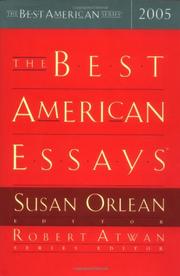

THE BEST AMERICAN ESSAYS 2005
edited by Susan Orlean
Guest editor Orlean shakes some dust off this valuable 20-year-old series, serving up a tasty sampler of the year’s more ruminative writing.
As series editor Robert Atwan notes in his forward, the essay was considered essentially dead when the first volume appeared in 1985, an assumption vigorously refuted here. Given Orlean’s long association with the New Yorker, it’s hardly surprising that 7 of her 25 selections first appeared there; it’s also more than justified, as the magazine was having a particularly fecund year, and she’s identified the cream of that excellent crop. Pieces from David Remnick’s fiefdom include Catherine Schine’s heartbreaking “Dog Trouble,” about what happens when a dog owner reaches the end of her leash; David Sedaris’s “Old Faithful,” in which a lanced boil becomes a metaphor for togetherness; and Ian Frazier’s zippy ode to forgetfulness, “If Memory Doesn’t Serve.” Harper’s contributes two treasures: Jonathan Lethem’s “Speak, Hoyt-Schermerhorn,” a poignant memory-poem about the Brooklyn subway stop of his childhood that metastasizes into a miniature history of the whole subway system and by extension New York itself; and Kitty Burns Florey’s delightfully geeky “Sister Bernadette’s Barking Dog,” which sings the nearly lost delights of diagramming sentences. Many of the pieces concern the authors’ little joys, which are then spun into larger tapestries of linguistic pleasure. This is an almost unseemly happy book, with a few exceptions. In “The Sea of Information” (from the Kenyon Review), Andrea Barrett details research for a historical novel, funded by a fellowship that began in New York City on September 10, 2001. In “Consider the Lobster,” originally published in Gourmet, David Foster Wallace travels to the Maine Lobster Festival and vigorously shakes until all the lies drop right out of the lobster, and ultimately the meat industry. Two essays heavily reference the late Julia Child—and who could have a problem with that?
Makes up for 12 months’ worth of missed magazines in one fell swoop.